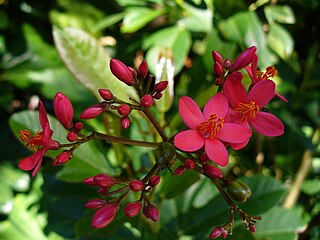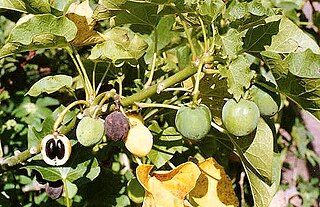
Biofuel is a fuel that is produced over a short time span from biomass, rather than by the very slow natural processes involved in the formation of fossil fuels, such as oil. Biofuel can be produced from plants or from agricultural, domestic or industrial biowaste. The climate change mitigation potential of biofuel varies considerably, from emission levels comparable to fossil fuels in some scenarios to negative emissions in others. Biofuels are mostly used for transportation, but can also be used for heating and electricity. Biofuels are regarded as a renewable energy source.

Jatropha is a genus of flowering plants in the spurge family, Euphorbiaceae. The name is derived from the Greek words ἰατρός (iatros), meaning "physician", and τροφή (trophe), meaning "nutrition", hence the common name physic nut. Another common name is nettlespurge. It contains approximately 170 species of succulent plants, shrubs and trees. Most of these are native to the Americas, with 66 species found in the Old World. Plants produce separate male and female flowers. As with many members of the family Euphorbiaceae, Jatropha contains compounds that are highly toxic. Jatropha species have traditionally been used in basketmaking, tanning and dye production. In the 2000s, one species, Jatropha curcas, generated interest as an oil crop for biodiesel production and also medicinal importance when used as lamp oil; native Mexicans in the Veracruz area developed by selective breeding a Jatropha curcas variant lacking the toxic compounds, yielding a better income when used as source for biodiesel, because of its edible byproduct. Toxicity may return if edible Jatropha is pollinated by toxic types.
Cellulosic ethanol is ethanol produced from cellulose rather than from the plant's seeds or fruit. It can be produced from grasses, wood, algae, or other plants. It is generally discussed for use as a biofuel. The carbon dioxide that plants absorb as they grow offsets some of the carbon dioxide emitted when ethanol made from them is burned, so cellulosic ethanol fuel has the potential to have a lower carbon footprint than fossil fuels.

In industrial chemistry, black liquor is the by-product from the kraft process when digesting pulpwood into paper pulp removing lignin, hemicelluloses and other extractives from the wood to free the cellulose fibers.
The Society of Chemical Industry (SCI) is a learned society set up in 1881 "to further the application of chemistry and related sciences for the public benefit".

Biofuel development in India centres mainly around the cultivation and processing of Jatropha plant seeds, which are very rich in oil, ranging from 27 to 40%, and averaging 34.4%. The drivers for this are historic, functional, economic, environmental, moral and political.
A nonfood crop, also known as industrial crop, is a crop grown to produce goods for manufacturing, for example fibre for clothing, rather than food for consumption.
The Wisconsin Bio Industry Alliance (WBIA) is a non-profit membership organization intended to promote biofuels, biopower, and bioproducts in Wisconsin. The group was formed in January 2007 as an outgrowth of a number of different organizations, including the Wisconsin Ethanol Producers Association and the Governor's Bio-based Industry Consortium. Current members include all of the state's five ethanol producers and the state's first large-scale biodiesel producer. The alliances recognizes those organizations who contribute to the state's bio industry, and the organization's founder, Joshua Morby regularly speaks on topics including the benefits of ethanol production.
Biogasoline, or biopetrol, is a type of gasoline produced from biomass such as algae. Like traditionally produced gasoline, it is made up of hydrocarbons with 6 (hexane) to 12 (dodecane) carbon atoms per molecule and can be used in internal combustion engines. Biogasoline is chemically different from biobutanol and bioethanol, as these are alcohols, not hydrocarbons.

Nervonic acid is a fatty acid. It is a monounsaturated analog of lignoceric acid (24:0). It is also known as selacholeic acid and cis-15-tetracosenoic acid. Its name derives from the Latin word nervus, meaning nerve or sinew.
Syngas fermentation, also known as synthesis gas fermentation, is a microbial process. In this process, a mixture of hydrogen, carbon monoxide, and carbon dioxide, known as syngas, is used as carbon and energy sources, and then converted into fuel and chemicals by microorganisms.
The Joint BioEnergy Institute (JBEI) is a research institute funded by the United States Department of Energy. JBEI is led by the Lawrence Berkeley National Laboratory, and includes participation from the Sandia National Laboratory, Lawrence Livermore National Laboratory, as well as UC Berkeley, UC Davis, Iowa State University, and the Carnegie Institute. JBEI is located in Emeryville, California.
Bioproducts or bio-based products are materials, chemicals and energy derived from renewable biological material.
Biorefining is the process of "building" multiple products from biomass as a feedstock or raw material much like a petroleum refinery that is currently in use. A biorefinery is a facility like a petroleum refinery that comprises the various process steps or unit operations and related equipment to produce various bioproducts including fuels, power, materials and chemicals from biomass. Industrial biorefineries have been identified as the most promising route to the creation of a new domestic biobased industry producing entire spectrum of bioproducts or bio-based products.

NNFCC is a consultancy company specialising in bioenergy, biofuels and bio-based products.
Bioproducts engineering or bioprocess engineering refers to engineering of bio-products from renewable bioresources. This pertains to the design and development of processes and technologies for the sustainable manufacture of bioproducts from renewable biological resources.

The Great Lakes Bioenergy Research Center (GLBRC) is one of four bioenergy research centers established in 2007 by the U.S. Department of Energy. It is led by the University of Wisconsin-Madison with Michigan State University as a primary partner. The goal of GLBRC is to create biofuels and bioproducts that are economically viable and environmentally sustainable. GLBRC provides a collaborative environment in which researchers with diverse backgrounds are drawn together by their pursuit of scientific questions related to developing sustainable biofuels and bioproducts. GLBRC research focuses on engineering bioenergy crops to enhance their environmental and economic value, generating multiple products from plant biomass, and optimizing the field-to-product pipeline. Its research is integrated across many disciplines and areas of focus, coordinating efforts between academic, federal, and private sector bodies as part of the field-to-product pipeline.

Bart Muys is a Belgian professor of forest ecology and forest management at the KU Leuven. His research focuses on the ecosystem functioning of tree diversity, the ecology of forest restoration and the evaluation of sustainability in forests and bioenergy systems. He is one of the most cited scientists internationally in the field of silviculture and forest management.
GCB Bioenergy: Bioproducts for a Sustainable Bioeconomy is a monthly peer-reviewed scientific journal covering research on the interface between biological systems and the production of bioenergy, biofuels and bioproducts directly from plants, algae and waste. The editor-in-chief is Stephen P. Long, environmental plant physiologist, Fellow of the Royal Society and member of the National Academy of Sciences.







